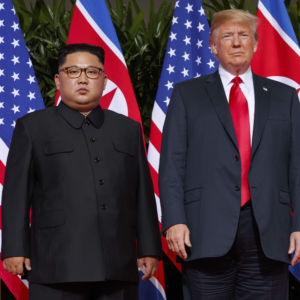WASHINGTON — Here in the swamp of the American capital, you appreciate how easy it is to forget about Korea when North Korea isn’t firing missiles and testing warheads or, conversely, when no one’s talking about another summit between President Trump and Kim Jong-un.
That’s not to say no one is raising the possibility, but it’s not in the news. Nor, for that matter, is there much news about President Moon Jae-in’s interaction with North Korea. Assuming Moon does go to Pyongyang for his third summit with Kim, you’ve also got to believe he’ll be impressing on his host the need for another summit with Trump in the interests of getting around a few, shall we say, “misunderstandings.”
The primary misunderstanding is there’s no definition of “complete denuclearization,” as called for in the brief statement so ostentatiously signed by Trump and Kim in Singapore on June 12.
Actually, while you see very little in the media about what’s happening in Korea, you hear that some of Trump’s top aides would prefer their boss not meet Kim again. That’s because there’s no telling what Trump will do.
Everybody was caught completely by surprise by Trump’s decision, with no prior consultation with Defense Secretary Jim Mattis, to cancel joint U.S.-South Korean exercises that were to have been held last month. Trump may have talked over that idea during his 28 minutes alone with Kim when nobody else but their interpreters were in the room, but he did not mention it in the open session right afterward at which he sat down with Secretary of State Mike Pompeo and National Security Adviser John Bolton facing Kim and his top aides seated opposite them.
Now the concern is what Trump might do or say if he meets Kim again. Might he, with no prior discussion with Pompeo, Bolton or anyone else, simply tell Kim, right, we know, the Korean War is over so let’s sign that “peace declaration” you’ve been asking about. That would be fine by Moon, who also wants a peace declaration formally ending the Korean War, but most Americans inside the policymaking process are not enthusiastic about the idea. They see North Korea going from there with demands for a peace treaty, withdrawal of American troops and destruction of the elaborate structure set up by the Korean War armistice of July 1953.
Probably the most frustrating worry, for many at top levels of government, is Trump’s unpredictability, his volatility, his short attention span and his reluctance, some would say refusal, to do background reading and sit through briefings, as needed to be sure of what he’s doing. Bob Woodward, the famous investigative journalist who, together with Washington Post colleague Carl Bernstein, broke the Watergate scandal that led to the downfall of Richard Nixon as president, has come out with a book revealing not only Trump’s ignorance but very possibly his stupidity.
Woodward writes that Mattis, after briefing Trump on defenses against North Korean missiles, was “particularly exasperated and alarmed, telling close associates that the president acted like — and had the understanding of — ‘a fifth- or sixth-grader.’ ” The White House chief of staff, John F. Kelly, is quoted saying, “He’s an idiot, it’s pointless to try to convince him of anything, he’s gone off the rails.”
Or, if Trump is not really all that stupid, he’s way out of his depth on North Korea. He caught military commanders completely by surprise, for instance, when he said that the war games conducted by U.S. and South Korean troops were “provocative.” Who put that incendiary word in his mouth? Kim Jong-un, perhaps, in their one-on-one session.
Trump may not know it, but his judgment on the value and role of U.S. forces in Korea is at odds with the outlook of his bedrock voters, many of whom have served in the armed forces or come from families with military backgrounds. How can Trump claim to be making American “great again” when he shows such disrespect for what American forces have been doing in Korea since the Korean War?
It’s not likely that Trump has studied the history of the American role in rescuing South Korea from North Korean and Chinese forces in the Korean War. In his second summit with Kim, he could decide to withdraw American forces from South Korea as an economy measure, saying they were hardly worth the expense while the U.S. suffers from an enormous trade deficit with the South.
In fact, Trump lacks the intellect, the vision or the understanding needed to make important decisions affecting U.S. forces overseas. That’s why those close to him think the risks of a second Trump-Kim summit outweigh the gains. Kim is not going to say, Mr. President, thank you so much, now we will start dismantling our nuclear program. Trump may not want to admit it, but that’s not going to happen.

